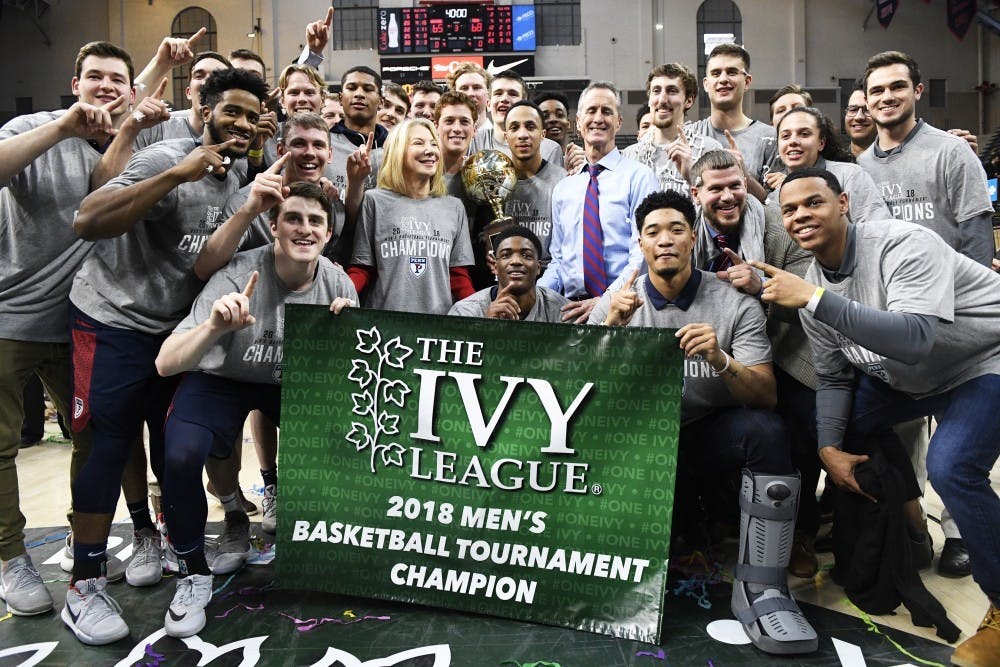“You typically don’t come out of this place when it’s light outside,” Darnell Foreman (C’ 18) said, gesturing to the court in front of him at the Palestra.
His voice echoes in the silence of the arena, empty in the mid–morning hours. Looking at the expanse of deserted bleachers, it’s hard to believe that only a few weeks ago they were packed with fans, watching the basketball team win the Ivy League Tournament.
Darnell is referring to his schedule: with four to five hours of practice a day, players often don’t leave the Palestra until past dark.

Darnell Foreman
It’s been a good year for Penn Men’s Basketball—the team won the Ivy League Tournament and played in March Madness for the first time in eleven years. For Darnell and his co–captains, Matt MacDonald (C' 18) and Max Rothschild (C’ 19), this season’s victories are the result of years of hard work.
Student athletes manage a demanding schedule of practices and workouts on top of the endless school assignments Penn academics requires. Balancing homework with the deluge of athletic commitments requires precision and effort.

Matt MacDonald
In short, to be a basketball player at Penn, you have to work hard.
According to Matt, keeping up with it all means thinking about only one task at a time. “Whenever you’re in [the Palestra], in the locker room… practice, working out, that’s your focus. When you’re not, you turn the same focus that you had here towards school.” But, he admits “that’s easier said than done.”
As student athletes in the Ivy League, team members face a different set of challenges than they might at a more sports–focused college or university. Academics are a hefty burden for already busy athletes, and sports aren’t always the biggest focus of the student body.
At big state schools, athletics are an essential part of social life—after every football game at schools like the University of Michigan, Facebook feeds are crowded with selfies of yellow and blue clad students, overlooking a massive crowd. Here at Penn, a crowd of that size at a sporting event is difficult to imagine. Students are more likely to attend networking events than basketball games.
“It’s different in the Ivy League than if you’re at a Big Twelve school like, say, Kansas,” said Max. “If you’re an athlete there, then you’re basically just an athlete. There’s less focus on the school part for those guys, because they’re one of those programs that funnel people to the NBA, to play professionally.”

Max Rothschild
These differences—more restrictive academic schedules, less publicity—might seem like downsides, but in some ways, Darnell has found these circumstances motivating. “Obviously you don’t get as much recognition as at other schools, but I think it makes people try harder, work harder. Because if you win something here, people are going to have to recognize it.”
This season, the team has certainly earned recognition. After their Ivy League Tournament win, Men’s Basketball was suddenly everywhere. “Ivy League Champions” scrolled across the electronic signs of Penn buses. Facebook was cluttered with pictures of the team, including one with Penn President Amy Gutmann wearing an “Ivy League Champions” tee shirt. A new banner appeared in the Palestra.
Post–tournament, more people have started recognizing the team members in public, catching them off guard. “It’s cool, you know, we’re just not used to that,” Darnell said, laughing. “But we’ll gladly get adjusted to it.”
Despite the work being a student athlete requires, playing college basketball has long been a dream for all three co–captains.
“You grow up watching March Madness,” said Max. “And now we’re in it.”







